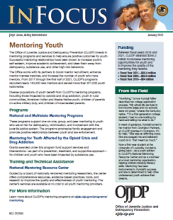Juvenile delinquency prevention
The Consequences of School Violence: A Systematic Review and Meta-Analysis
TECHBeat, January 2019
TECHBeat, October 2019
Connect & Thrive: Maintaining Tribal Youth Connections During a Public Health Crisis
Brevard Public Schools School Safety and Climate Study: Final Summary Overview
Understanding School Safety and the Use of School Resource Officers in Understudied Settings
Strengthening Connections
Youth mentoring relies on the power of human connections. Maintaining those connections in the face of the COVID-19 pandemic may be challenging, but it is an important and worthwhile effort. As President Trump said, “Mentors serve not only as role models for young people but also as an inspiration to dream big and pursue any goal—regardless of circumstance.”
The Office of Juvenile Justice and Delinquency...





